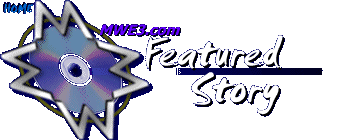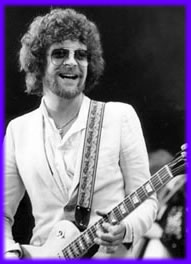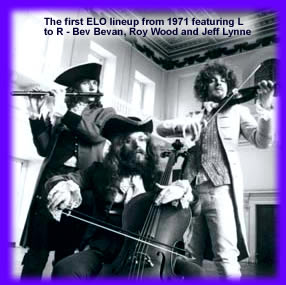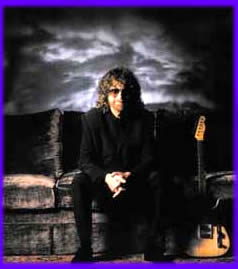|
|
|||
 conducted by Robert Silverstein and Larry Acunto for mwe3.com and 20th Century Guitar www.tcguitar.com |
|
||
|
|
|||
|
Part 2 Jeff Lynne
(JL) LA: Do you like producing?
LA: When you sit there and youíre working on a song that youíre doing the bass and drums, where do you start? JL: Where do you start? With a click track! (laughter). LA: Obviously you canít put the drums down first. JL: No you just put some kind of tempo down. LA: Itís funny Ďcos we were talking to some guy out in California, Jason Falkner. I donít know if youíd heard of him. A young guy who just put out a fantastic album. And he did all the instruments on the album. I asked him, Ďwhere do you start?í and he said ĎI always put the drum track down first.í (laughter) But he did. RS: I heard that George is planning a new album. Are you going to be involved in that? JL: I donít know anything about that, sorry. RS: Iíd like to talk with you about some of your productions. Your work on "Let It Shine" from the 1988 Brian Wilson solo album. Brian stated in an interview that you wrote a good portion of that song. How did that whole thing come together? JL: Brian played keyboards on it. I played bass on it and guitar and some piano. But mostly, Brian did all his own harmonies. Fantastic, big block harmonies. It suddenly sounds like, ah...The Beach Boys. And it was fun doing it. It was different. RS: He lives in L.A. and you live in L.A. I was thinking you and Brian could do something like that again. Brian and Ringo worked together on Ringoís last album. Do you ever see Brian in L.A.? JL: I see him now and again, in restaurants... RS: Could we talk a little about Roy Orbison? I was reading your description of how powerful Royís voice really was. Any other memories? JL: Oh lots. Mainly the difference of him mumbling through the words just to get used to the meter. And then him strokiní it up. It was so shocking. Wow!! LA: Did you crank the meters while he was mumbling? JL: Yeah. LA: When you were working on Zoom did you have an engineer in the room with you? JL: Sometimes two. LA: So youíre not on the board doing it yourself? JL: No, Iím not doing it meself. Itís got too far advanced now for me, Pro Tools, which is great. I know how it works, but I canít hit all the right buttons. LA: One of the things about Zoom that I noticed when I first listened to it, and you brought up an interesting point - is that music in the Ď90s, and now in the 2000ís - is that it sounds digital and I hate digital. But I read that you do have Pro Tools digital... JL: Yeah but I go to analog first. LA: It sounds it. Itís got the warmth. JL: And also Pro Tools is 24 bit which is better than a CD anyway. And so I sort of got converted when I went 24 bit. My engineers convinced me. Both my engineers, theyíre both from the analog school but they both draw from the digital world as well. So theyíre both experts at both things. LA: So youíre starting on tape and then going digital? JL: I record everything on tape. Two inch. Sometimes two, two inchís. RS: Both me and Larry are big fans of the first ELO album with the "10538 Overture". I know EMI in England is putting it out as a double CD along with CDs of The Moveís Message From The Country and Roy Woodís Boulders. It seems the perfect time to once again dust off the first fabled ELO album. JL: I think theyíve actually put it out a few times already, yíknow before. Itís a good thing, yeah. Supposedly itís in quadraphonic. Me and Roy (Wood) never did it in quadraphonic. I did the next one in quadraphonic. RS: I know Sony is putting out the upcoming ELO reissues in America and I guess EMI is doing it England. JL: I think itís just the first two albums that EMI owns and the rest are owned by Sony. LA: Did they involve you at all with the reissues?
RS: The ELO box set Flashback sounds great. I know you were really involved with that. JL: Yeah, I enjoyed it. It was real hard work. It took six months to do that box set. RS: I know youíve worked with some of your great guitar heroes including Duane Eddy and Hank Marvin. I guess those influences were big for you? JL: Oh yeah. RS: You recorded "Theme For Something Really Important" and "The Trembler" with Duane. George Harrison was on there as well. JL: Yeah, George played on there. RS: I guess The Shadows were a huge influence as well. JL: Absolutely. I learned every tune by The Shadows on me first guitar, a plastic one I borrowed from my friend. An Elvis Presley guitar. I learned all Shadows tunes on it. One finger up this plastic neck. Then I had this bright idea, putting a bass string on it. A low E string. On this plastic neck. And I had to pretend to me friend that it wasnít broken, really. Iíd say, ĎOh, Iím just practicing one more tune, and then you can have it back.í ĎOh, sorry here it Ďtisí. All smashed to bits! (laughter) RS: You also worked with Roy Wood again in 1990 on some unreleased tracks. "Me And You" and "Get What You Want". JL: Oh yeah. Just a little demo in England we did, those two little tunes. RS: Do you speak with Roy sometimes? JL: I havenít talked with him in a while. But weíre friends, yíknow? He lives in England, I live over here. I donít see him alot. I suppose itís a couple of years since Iíve seen him. RS: Is there anybody who you havenít worked with that you want to work with? JL: I donít think so. I think thatís how I came to make the new ELO album, because I think Iíve produced and worked with all the heroes that I wanted to. More or less. So the next thing to do was to produce meself again. LA: Isnít it amazing that your career was able to take you to the point where you got to do all those things? JL: Oh, totally amazing! I mean, I still marvel at it. Sometimes I lie there, yíknow having a snooze, and then think back over all those sessions. And itís great. I have to tell you. Iím very privileged to have worked with them all. RS: I had interviewed Mike Pinder of The Moody Blues and he told me the quintessential pop song of all time, he thinks, is "I Am The Walrus". Where the mellotrons were replaced by strings. What do you think is the quintessential pop song of all time?
RS: Thatís in essence, where you, Roy Wood and Bev Bevan were heading way back when on the first ELO album? JL: Thatís what Roy said to a paper once and it stuck for years afterwards and it was a real drag trying to live that one down! (laughter). I never said it. RS: The year 1971 was the year the first Electric Light Orchestra album came out and I was thinking about all the other classic rock albums that came out that year like Bowieís Hunky Dory and Thick As A Brick from Tull. What was it about 1971 that stimulated such an burst of creative musical masterpieces? JL: Beatís me! (laughter). Everybody seemed to be just into recording I think. I can only tell you from me own point of view. Iíd done a couple albums with The Idle Race and thought I was, like experienced in the studio by then. And I suppose everybody else did too and started experimenting. Thinking I knew what it was all about. Obviously, thereís many levels of making records. When you make your first one you think itís great. Wow, thatís a record with a label on it and everything! And then eventually you get a gold record. I never dreamed Iíd have one of them. I never really thought I would. Anyway, I ended up with loads of them, hundreds of them!
|
|||
|
|
For audio
samples you'll
|
||
|
|
|||

 JL: Oh, I love
producing! When everybody started asking me after Iíd done Cloud
9...Tom Petty came to me and said, ĎDo you fancy writing some
songs together?í, I said, ĎSure, love toí. And thatís how we got
Full Moon Fever. That was a year after...an album that I really
love as well.
JL: Oh, I love
producing! When everybody started asking me after Iíd done Cloud
9...Tom Petty came to me and said, ĎDo you fancy writing some
songs together?í, I said, ĎSure, love toí. And thatís how we got
Full Moon Fever. That was a year after...an album that I really
love as well. JL: They do
yeah, but they didnít used to though. It used to bother me when Iíd
find like really strange tracks next to each other that didnít really
belong. But now theyíve come and asked for meself and my managerís
input. Especially Sony. Sony has been actually brilliant. Every step of
the way theyíve been totally one hundred percent behind it.
JL: They do
yeah, but they didnít used to though. It used to bother me when Iíd
find like really strange tracks next to each other that didnít really
belong. But now theyíve come and asked for meself and my managerís
input. Especially Sony. Sony has been actually brilliant. Every step of
the way theyíve been totally one hundred percent behind it. JL: Itís a
tough question, but I probably would have said "I Am The
Walrus". (laughter) But I wouldnít call it a pop song as such. I
think itís just the greatest recording. The greatest pop recording. Itís
a marvelous song. Itís lyrics are like, so peculiar and fantastically
outrageous. Itís just a nice, beautiful blend of stuff, like
outrageous stuff. Tuning the radio at the end, live on the mix. Ringo
tuning in the radio. I mean, itís got to be the best recording I ever
heard.
JL: Itís a
tough question, but I probably would have said "I Am The
Walrus". (laughter) But I wouldnít call it a pop song as such. I
think itís just the greatest recording. The greatest pop recording. Itís
a marvelous song. Itís lyrics are like, so peculiar and fantastically
outrageous. Itís just a nice, beautiful blend of stuff, like
outrageous stuff. Tuning the radio at the end, live on the mix. Ringo
tuning in the radio. I mean, itís got to be the best recording I ever
heard.